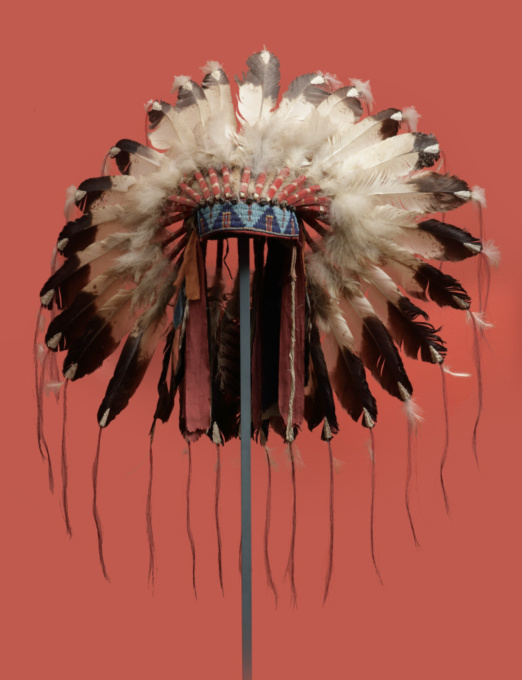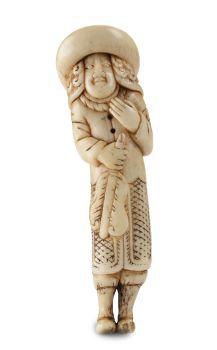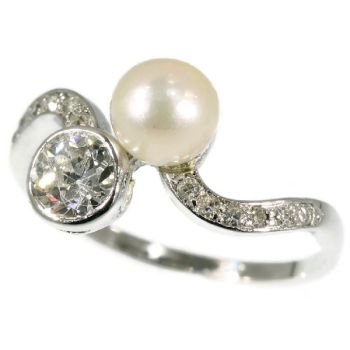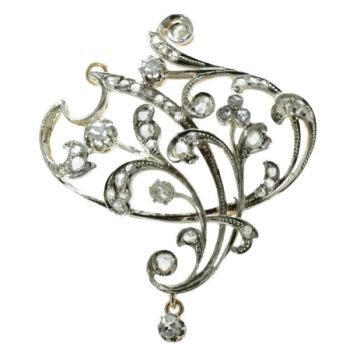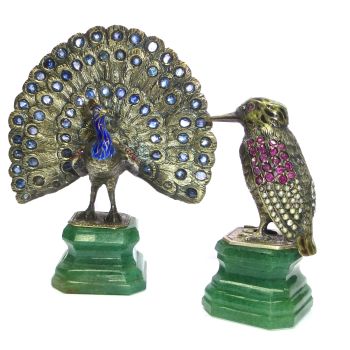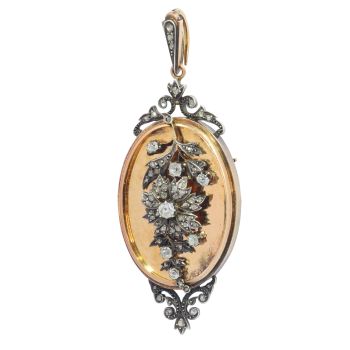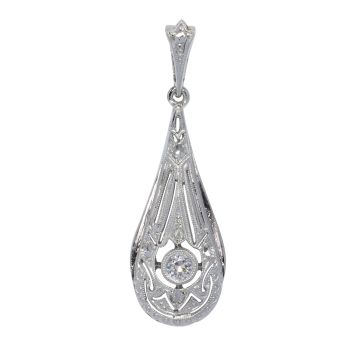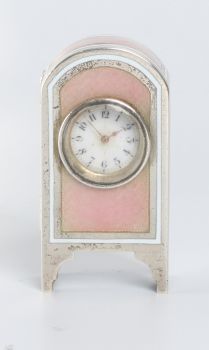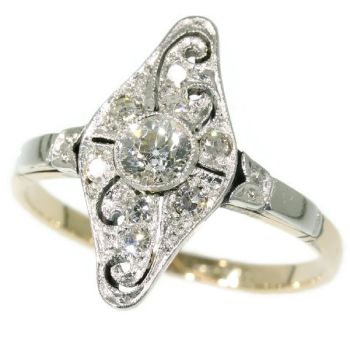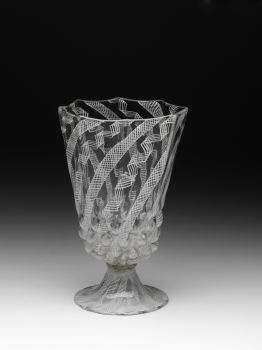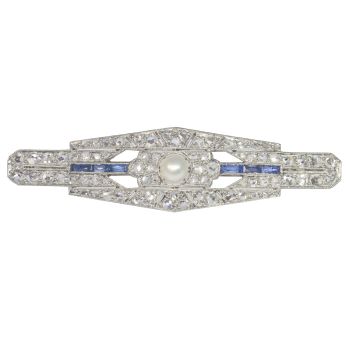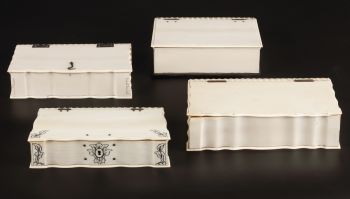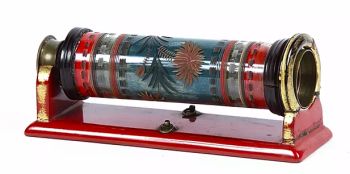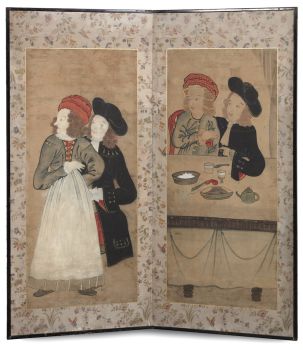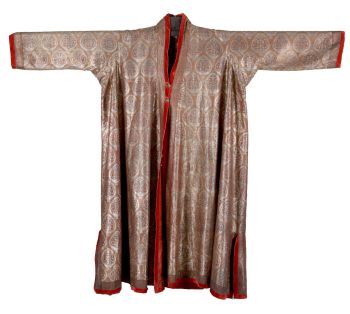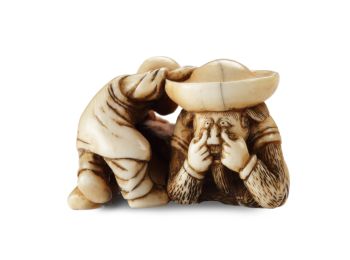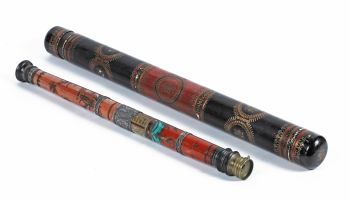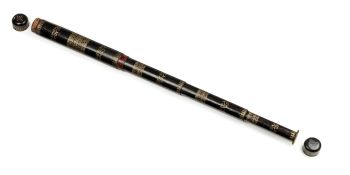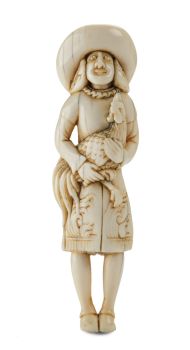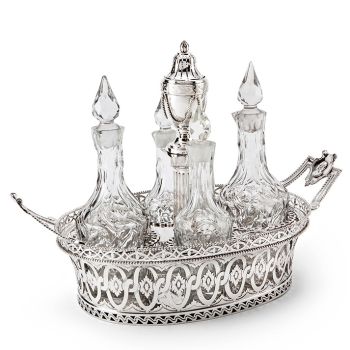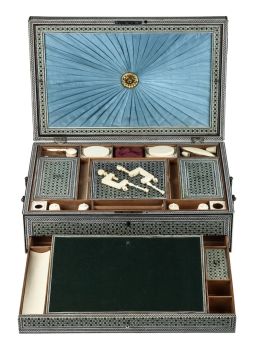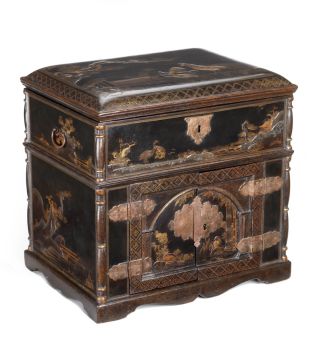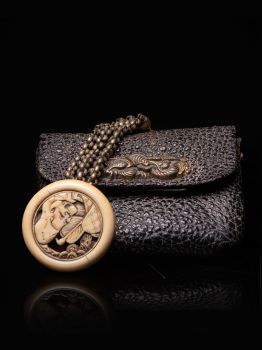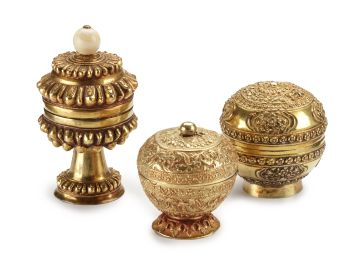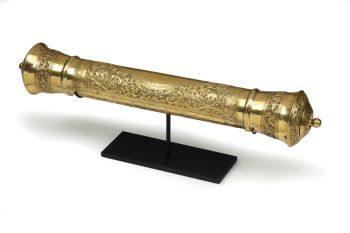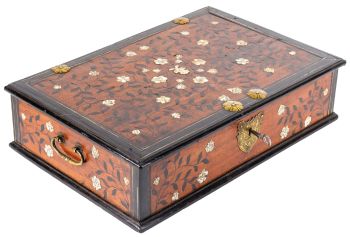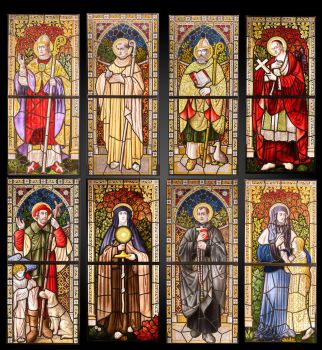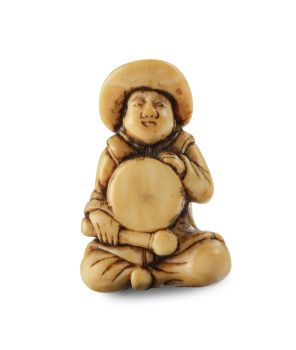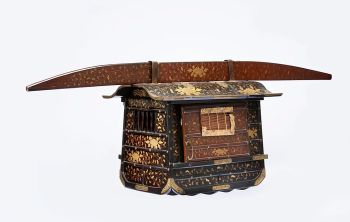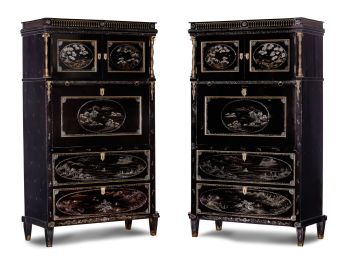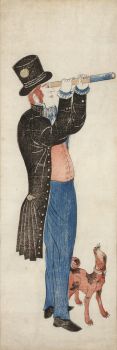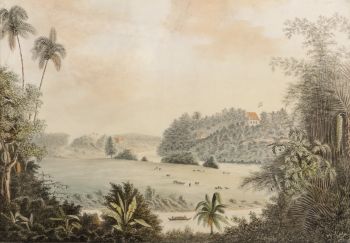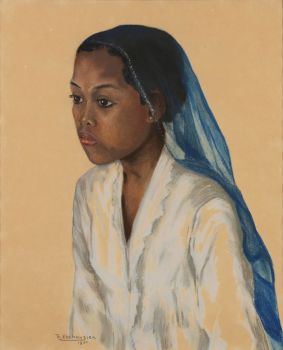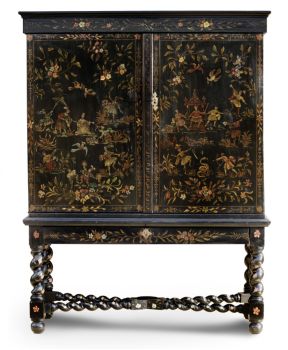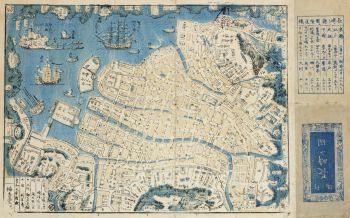A Lakota warrior’s feather headdress North or South Dakota, United States of America 1910 - 1930
Onbekende Kunstenaar
201 cm
Prijs op aanvraag
Zebregs & Röell - Fine Art - Antiques
- Over kunstwerkH. 201 cm (incl. standard)
This ritual headdress consists of an assembly of 28 eagle feathers attached to a leather and felt hat using pieces of red fabric from uniforms of the American army or long strips of fabric of English origin exchanged at trading posts.
The feathers belong to the Golden Eagle (Aquila chrysaetos) and are decorated at the end with dyed red horsehair (Equus caballus). The top of the cap is ornamented with bells and fur that are visible between the feathers above the beaded band. A multicoloured beaded band featuring geometric patterns reminiscent of the shape of tepees unfolds at the forehead. The beads came from exchanges with American traders. Furthermore, the headdress has side pendants made of strips of coloured fabric. At the back of the headdress, under the central feather, a beautiful decorative element can be seen: a braided and dyed porcupine quill and a set of brown eagle feathers.
This type of eagle feather headdress was the most important and imposing symbol of prestige for the warriors of the Plains. Only prominent warriors earned the right to wear a full-feather headdress. According to the Lakota, the eagle is the symbol of sacred warrior power. More specifically, the eagle is considered the 'master of the sky and the birds', and its feathers are symbols of bravery and wisdom.
The down feathers, undulating with the slightest breath of air, were seen as a tool of communication with the spirit world. The making of a headdress gave rise to numerous ceremonies and songs celebrating the valour of the warrior for whom the headdress was intended. During the making of the headdress, each time a feather was added, one of the great feats of arms of the warrior was recalled. As such, once the headdress is finished, it constitutes a trophy recalling the many victories of the warrior and, more broadly, of the whole tribe. Within the tribe, only the chiefs and a limited number of men were authorized to wear a war cap. The wearing of the headdress was absolute proof of bravery in battle, and all members of the tribe owed respect to whoever wore it. Today, native leaders present feather headdresses to government officials and politicians to signify a diplomatic relationship.
This headdress was probably brought to Europe by a Lakota tribesman. Several groups of Lakota travelled Europe to perform and showcase their culture. During the expositions, they were often placed in a village-like setting where spectators could view them like in a zoo.
A comparable headdress can be found in the Metropolitan Museum of Art (on loan from the Eugene and Clare Thaw Collection, Fenimore Art Museum, Cooperstown).
Sources:
Marc Petit, Mémoires Indiennes, Champollion Museum, Figeac, 2011
Steve Friesen, Lakota Performers in Europe: Their Culture and the Artifacts They Left Behind, University of Oklahoma Press, Norman, 2017 - Over kunstenaar
Het kan voorkomen dat een kunstenaar of maker onbekend is.
Voor sommige werken is het niet te bepalen door wie het gemaakt is of dat het is gemaakt door (een groep) ambachtslieden. Voorbeelden zijn beelden uit de Oudheid, meubels, spiegels of handtekeningen die vaak niet duidelijk of leesbaar zijn. Maar ook sommige werken zijn helemaal niet gesigneerd.
Ook kunt u de volgende beschrijving vinden:
•"Toegeschreven aan …." waarschijnlijk een werk van de kunstenaar maar niet zeker of gedeeltelijk
•“Atelier van ….” of werkplaats van” een werk uitgevoerd in het atelier of atelier van de kunstenaar, eventueel onder zijn toezicht
•“Cirkel van ….” een werk uit de periode van de kunstenaar die zijn invloed laat zien, nauw verbonden met de kunstenaar maar niet noodzakelijkerwijs zijn leerling
•“Stijl van ….” of “Volger van ….” een werk uitgevoerd in de stijl van de kunstenaar, maar niet noodzakelijk door een leerling; kan eigentijds of bijna eigentijds zijn
•“Wijze van ….” een werk in de stijl van de kunstenaar maar van latere datum
•"Na …." een kopie (van welke datum dan ook) van een werk van de kunstenaar
•“Getekend…”, “Gedateerd….” of “Ingeschreven” dan is het werk gesigneerd/ gedateerd/ ingeschreven door de kunstenaar. De toevoeging van een vraagteken duidt op een element van twijfel
•"Met handtekening ...", "Met datum ...", "Met opschrift..." of “Draagt signatuur/datum/opschrift” dan is de handtekening/datum/opschrift toegevoegd door iemand anders dan de kunstenaar
Bent u geïnteresseerd om dit kunstwerk te kopen?
Artwork details
Related artworks
Onbekende Kunstenaar
Art nouveau en art déco objecten1900 - 1930
Prijs op aanvraagBob J. Shimanovich Kunsthandel
Onbekende Kunstenaar
Een zeldzame filigrana a retortoli bokaal1550 - 1600
Prijs op aanvraagPeter Korf de Gidts - Antiquairs
1 - 4 / 12Onbekende Kunstenaar
EEN COLLECTIE VAN VIER SRI LANKAANSE IVOREN BIJBEL DOZEN18th century
Prijs op aanvraagZebregs & Röell - Fine Art - Antiques
Onbekende Kunstenaar
AN IVORY NETSUKE OF A DUTCHMAN FROLICKING WITH A SMALL BOY18th century
Prijs op aanvraagZebregs & Röell - Fine Art - Antiques
Onbekende Kunstenaar
A RARE LARGE JAPANESE LACQUERED LEATHER TELESCOPE1750 - 1800
Prijs op aanvraagZebregs & Röell - Fine Art - Antiques
Onbekende Kunstenaar
EEN IVOREN NETSUKE VAN EEN NEDERLANDER MET EEN HAAN18th century
Prijs op aanvraagZebregs & Röell - Fine Art - Antiques
Onbekende Kunstenaar
EEN VERGULD-ZILVER SRI LANKAANSE DOCUMENTEN ROLCONTAINER19th century
Prijs op aanvraagZebregs & Röell - Fine Art - Antiques
Onbekende Kunstenaar
A SMALL IVORY NETSUKE OF A DUTCHMAN WITH A DRUM1750 - 1800
Prijs op aanvraagZebregs & Röell - Fine Art - Antiques
Onbekende Kunstenaar
EEN JAPANS MODEL VAN EEN NORIMONO, EEN DRAAGSTOEL1650 - 1700
Prijs op aanvraagZebregs & Röell - Fine Art - Antiques
1 - 4 / 24Onbekende Kunstenaar
The Stamford Raffles Secretaires.1800 - 1813
Prijs op aanvraagZebregs & Röell - Fine Art - Antiques
Onbekende Kunstenaar
A Dutch colonial Indonesian betel box with gold mounts1750 - 1800
Prijs op aanvraagZebregs & Röell - Fine Art - Antiques
Onbekende Kunstenaar
A silver spoon commemorating Juff’ Margareta van Hoorn1656 - 1694
Prijs op aanvraagZebregs & Röell - Fine Art - Antiques
1 - 4 / 12

